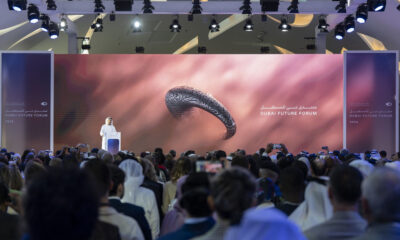News
Dubai Survey Drones Explore Minerals In Central Asia
The UAVs reduce costs and boost efficiency by replacing helicopters and large teams of researchers and geophysicists.

Microavia, a UAE-based company established in Dubai in 2022, delivers drone-based solutions for security, monitoring, and surveying.
Now, the company is helping geologists and researchers explore mineral deposits in Central Asia and Kazakhstan. Microavia’s advanced aerial surveying platform, Fortis, provides detailed information about an area’s geological structure, reducing task times by half and drastically cutting costs.
“We have successfully concluded all preflight tests with Microavia Fortis. A special feature of their geodrone is their ability to stay in the air for up to 60 minutes. The drone can carry up to 12 kg of payload. [and has] shown high efficiency in conducting aeromagnetic surveys due to the stability of the flight direction even in strong winds and long flight time,” explained Kirill Bazhin, CEO of Geodevice Kazakhstan.
Microavia drones hover at low altitudes between 40 and 100 meters, scanning the ground in 400-meter-wide sections. Hundreds of miles of land can be surveyed in days instead of weeks or months, and mineral exploration missions can now be undertaken in previously inaccessible areas.
“Big thanks to Microavia for supplying us with their drones for Terra Exploration. The 45-minute flight time with the magnetometer is quite impressive! Moreover, their team provided us with a beneficial and enjoyable pilot course. I can’t wait to start using these drones in our work,” said Nikita Shaliuto, geophysicist of Terra Exploration.
Also Read: The Middle East Is Rapidly Becoming An eSports Hub
According to recent reports, aluminum, copper, gold, and lithium deposits fall short of anticipated demand. Central Asia, and especially Kazakhstan, has a vast unexplored reserve of minerals, and drone-based exploration can help speed up their extraction.
Microavia’s export of advanced UAVs is also bolstering efforts by the UAE to diversify its industrial sector from traditional oil, petroleum, and gas production.
News
Samsung Smart Glasses Teased For January, Software Reveal Imminent
According to Korean sources, the new wearable will launch alongside the Galaxy S25, with the accompanying software platform unveiled this December.

Samsung appears poised to introduce its highly anticipated smart glasses in January 2025, alongside the launch of the Galaxy S25. According to sources in Korea, the company will first reveal the accompanying software platform later this month.
As per a report from Yonhap News, Samsung’s unveiling strategy for the smart glasses echoes its approach with the Galaxy Ring earlier this year. The January showcase won’t constitute a full product launch but will likely feature teaser visuals at the Galaxy S25 event. A more detailed rollout could follow in subsequent months.
Just in: Samsung is set to unveil a prototype of its augmented reality (AR) glasses, currently in development, during the Galaxy S25 Unpacked event early next year, likely in the form of videos or images.
Additionally, prior to revealing the prototype, Samsung plans to introduce…
— Jukanlosreve (@Jukanlosreve) December 3, 2024
The Galaxy Ring, for example, debuted in January via a short presentation during Samsung’s Unpacked event. The full product unveiling came later at MWC in February, and the final release followed in July. Samsung seems to be adopting a similar phased approach with its smart glasses, which are expected to hit the market in the third quarter of 2025.
A Collaborative Software Effort
Samsung’s partnership with Google has played a key role in developing the smart glasses’ software. This collaboration was first announced in February 2023, with the device set to run on an Android-based platform. In July, the companies reiterated their plans to deliver an extended reality (XR) platform by the end of the year. The software specifics for the XR device are expected to be unveiled before the end of December.
Reports suggest that the smart glasses will resemble Ray-Ban Meta smart glasses in functionality. They won’t include a display but will weigh approximately 50 grams, emphasizing a lightweight, user-friendly design.
Feature Set And Compatibility
The glasses are rumored to integrate Google’s Gemini technology, alongside features like gesture recognition and potential payment capabilities. Samsung aims to create a seamless user experience by integrating the glasses with its broader Galaxy ecosystem, starting with the Galaxy S25, slated for release on January 22.























